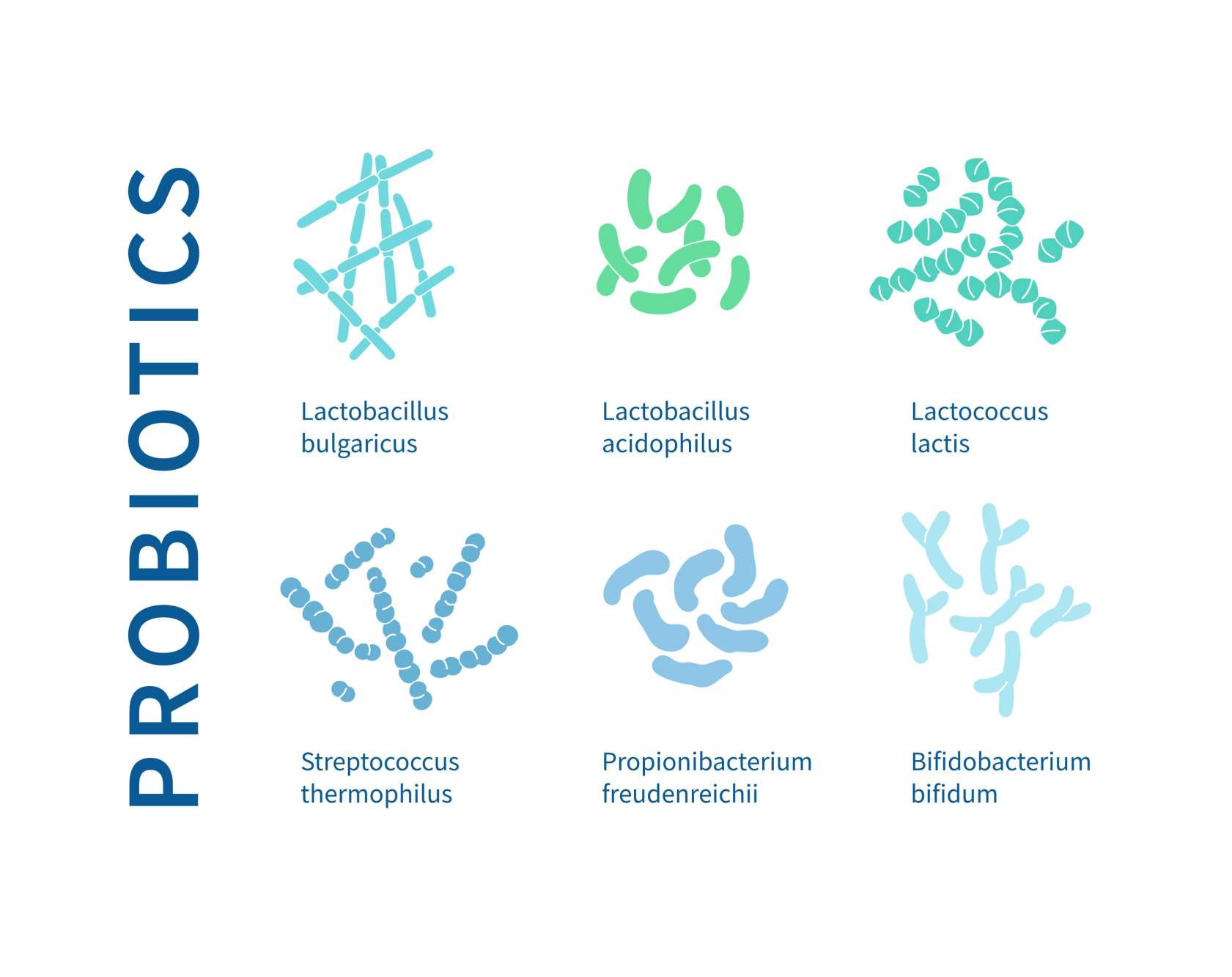Our Products Cannot Be Used As Medicines Directly For Personal Use.


Welcome! For price inquiries, please feel free to contact us through the form on the left side. We will get back to you as soon as possible.
Probiotics
Category
Probiotics are live microorganisms that provide health benefits when consumed in adequate amounts. These beneficial bacteria and yeasts, found primarily in the digestive system, play a critical role in maintaining overall health, particularly by improving gut health and boosting the immune system. The term "probiotics" is derived from the Greek words "pro" meaning "for" and "bios" meaning "life, " emphasizing their life-enhancing properties. Probiotics have become increasingly popular in recent years due to a growing awareness of the importance of gut health to an individual's overall well-being. In recent years, probiotics have gained widespread attention beyond human health, being increasingly promoted for use in animal feed to enhance livestock productivity, in the pharmaceutical industry for therapeutic and preventive purposes, and in cosmetics for their skin health benefits.
Creative Enzymes provides a comprehensive selection of premium probiotics, meticulously formulated to meet the highest standards of quality, purity, and safety. Our probiotic products are designed for diverse applications across the food, feed, pharmaceutical, and cosmetic industries. We offer single-strain probiotics from bacterial genera such as Bacillus, Bifidobacterium, Lactobacillus, Lactococcus, Leuconostoc, Saccharomyces, Streptococcus. In addition, our experts have developed a variety of probiotic blends tailored for human and animal health, environmental sustainability, and other specialized uses. For more details, please explore our Probiotic Blends page. Beyond probiotics, Creative Enzymes also offers paraprobiotics, which are derived from inactivated microorganisms treated by chemical or mechanical processes.

What Are Probiotics?
Probiotics are live microorganisms, primarily bacteria, and yeasts, that help balance the gut microbiome. The human body hosts trillions of microorganisms, with the gut being one of the most densely populated regions. While some bacteria are harmful, others, like probiotics, are beneficial and work to promote digestive health and prevent the overgrowth of pathogenic microbes.
Probiotics are found naturally in fermented foods such as yogurt, sauerkraut, kimchi, and kefir. They are also available in supplements that provide specific strains of beneficial bacteria or yeast. These microorganisms are hardy and can survive the harsh conditions of the gastrointestinal tract, allowing them to effectively reach the intestines and exert their beneficial effects.
Common Types of Probiotics
Probiotics consist of different strains of bacteria and yeasts, each offering unique health benefits. The most commonly used types of probiotics include:
Lactobacillus: This is one of the most common probiotic genera. Strains of Lactobacillus are found in fermented foods like yogurt and are often used to treat diarrhea, lactose intolerance, and irritable bowel syndrome (IBS). Lactobacillus acidophilus is one of the well-known strains used to maintain a healthy gut.
Bifidobacterium: This genus is also commonly found in probiotic supplements and foods. Bifidobacterium species are naturally present in the intestines and are essential for digestion and preventing harmful bacteria from overgrowing. Bifidobacterium longum and Bifidobacterium bifidum are known for their ability to reduce bloating and improve gut health.
Saccharomyces boulardii: This is a yeast species used as a probiotic, often to treat diarrhea caused by antibiotic use or infections. It is also known to support the immune system.
Streptococcus thermophilus: Often found in yogurt and cheese, Streptococcus thermophilus aids in the digestion of lactose and promotes digestive health.
Enterococcus faecium: This bacterium is found in the intestines of both humans and animals. It helps maintain a healthy gut environment by producing lactic acid, which suppresses the growth of harmful bacteria.
Bacillus coagulans: Unlike other bacteria, Bacillus coagulans can form spores, allowing it to survive harsh conditions, including the acidic environment of the stomach. It is used to alleviate symptoms of IBS and inflammatory bowel diseases.
Benefits of Probiotics
Probiotics offer a wide range of health benefits, particularly for the digestive and immune systems. Below are some key benefits:
Digestive Health: One of the primary roles of probiotics is to promote healthy digestion. They help balance gut bacteria, aiding in the breakdown and absorption of nutrients. Probiotics can also alleviate symptoms of gastrointestinal disorders such as diarrhea, IBS, and inflammatory bowel disease (IBD). They can prevent antibiotic-associated diarrhea by replenishing beneficial bacteria lost during antibiotic treatment.
Improved Immune Function: Probiotics can boost the immune system by stimulating the production of immune cells and antibodies. They help reinforce the gut barrier, preventing harmful pathogens from entering the bloodstream. Some studies suggest that probiotics may reduce the duration and severity of respiratory infections and common colds.
Mental Health Benefits: Emerging research suggests a connection between gut health and mental health, often referred to as the "gut-brain axis." Probiotics have been shown to alleviate symptoms of anxiety, depression, and stress in some individuals by modulating gut bacteria and influencing the production of neurotransmitters.
Cardiovascular Health: Some probiotics, particularly those from the Lactobacillus and Bifidobacterium genera, may help lower cholesterol levels and regulate blood pressure. Probiotics can break down bile acids in the gut, reducing the reabsorption of cholesterol into the bloodstream.
Skin Health: Certain probiotics can improve skin conditions such as acne, eczema, and rosacea. By promoting a healthy gut, probiotics reduce systemic inflammation, which can manifest as skin issues.
Risks and Side Effects of Probiotics
While probiotics are generally considered safe, they are not without risks, especially for individuals with compromised immune systems or underlying health conditions. Some potential risks include:
Infections: In rare cases, probiotic bacteria or yeast can cause infections, particularly in individuals with weakened immune systems or those who are critically ill.
Bloating and Gas: Some people may experience mild gastrointestinal symptoms, such as bloating, gas, or diarrhea, when starting probiotic supplements. These symptoms typically subside as the body adjusts.
Risk of Antibiotic Resistance: There is a potential concern that some probiotic strains could carry antibiotic resistance genes, which may transfer to pathogenic bacteria, leading to resistant infections.
Interaction with Medications: Probiotics may interfere with certain medications, particularly immunosuppressants and antifungal drugs. Consulting a healthcare provider before taking probiotics is essential, especially for individuals on medication or with chronic conditions.
Applications of Probiotics
The use of probiotics extends beyond dietary supplements and fermented foods. They are increasingly being used in various applications, including:
Food Industry: Probiotics are widely used in the food industry, particularly in functional foods and beverages aimed at improving health. Common probiotic-rich products include yogurt, kefir, kombucha and other fermented foods. These contain beneficial bacteria such as Lactobacillus and Bifidobacterium, which aid in digestion and gut health. Yogurt is a staple, while kefir and kombucha are gaining popularity for their probiotic content. Probiotics are also being added to baby formulas to support infant gut health and boost immunity. As consumers seek health-promoting foods, the demand for probiotic-enhanced products continues to grow.
Pharmaceuticals: Probiotics are being developed for therapeutic use in the treatment of gastrointestinal disorders such as irritable bowel syndrome, ulcerative colitis, and infections caused by Clostridium difficile. They help restore balance in the gut, reduce inflammation, and relieve symptoms. Probiotics are also being studied for their potential in managing metabolic diseases such as obesity and type 2 diabetes, as they may improve metabolic health and insulin sensitivity. As research continues, probiotics are expected to play a greater role in pharmaceutical treatments for various health conditions.
Animal Feed: Probiotics are used in animal feed to improve animal health and productivity. By promoting better digestion and nutrient absorption, probiotics help animals grow more efficiently and reduce the need for antibiotics. In livestock such as cattle, poultry and fish, probiotics support a healthy gut microbiome, which boosts immunity and reduces gastrointestinal disease. This not only improves the overall well-being of livestock, but also addresses concerns about antibiotic resistance, making probiotics an essential part of sustainable animal agriculture.
Cosmetics: The cosmetic industry is exploring probiotics for skin care because of their anti-inflammatory and microbiome-balancing properties. Probiotic-infused products such as creams and lotions aim to improve skin health by reducing acne, calming irritation and strengthening the skin's protective barrier. By supporting a balanced skin microbiome, these products help prevent breakouts and protect against environmental stressors. As consumers seek natural skin care solutions, probiotic-based cosmetics are becoming increasingly popular for maintaining healthy, resilient skin.

Probiotics are a promising avenue for improving health, particularly in the realms of digestion, immunity, and even mental well-being. With a growing body of research supporting their benefits, the use of probiotics in food, medicine, and beyond is expected to expand. Probiotics may cause potential side effects and interactions with certain medications, making it crucial for manufacturers to select high-quality, pure probiotic raw materials. Careful consideration of interactions with other supplement ingredients is essential, and consumers—particularly those with chronic conditions and compromised immune systems—should be advised to consult a pharmacist before use. Probiotics offer great potential for enhancing health, but as with any supplement, they should be used responsibly.
As a trusted supplier in the probiotic industry, Creative Enzymes offers an extensive range of around 150 high-quality probiotic strains and expertly crafted blends to meet diverse industry needs. We are committed to delivering solutions that enhance product quality and support your goals. If you have any questions or specific requirements, feel free to contact us for personalized assistance!




